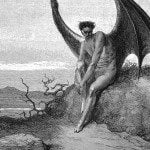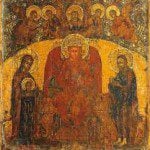Orthodox theologian and philosopher Fr. Alexander Men said that the use and pursuit of power is one of the most corrupting forces in humankind.  Its misuse and manipulation is seen at the workplace, in relationships, within families, and unfortunately among high ranking church officials of all denominations.
Its misuse and manipulation is seen at the workplace, in relationships, within families, and unfortunately among high ranking church officials of all denominations.
Those with the experience of seeing secular political power up close and the Machiavellian maneuverings of church leaders behind the scenes often conclude that religious politics is far worse then its secular counterpart. There is ruthlessness to church politics draped in the appearance of piety not found among elected politicians. Few denominations are immune from it.
Emperor Constantine should be blamed. He made Christianity the official  state religion. It formalized and corporatized God. Servants of the people became princes of the church.
state religion. It formalized and corporatized God. Servants of the people became princes of the church.
There is a power struggle now occurring in the Eastern Orthodox world. Its outcome not only has ramifications for Orthodox theology, but foreign policy as well. The titular head of world Orthodoxy, Ecumenical Patriarch Bartholomew of Constantinople and the leader of the Russian Orthodox Church of Moscow, Patriarch Kirill have publicly clashed over the arrest of a prominent Greek monk at Mount Athos.
The Ecumenical Patriarch is a bit like Queen Elizabeth II who heads the British Commonwealth, but Her Majesty is much better at her role. In addition, the title of Patriarch is comparable to a Roman Pope accept each Orthodox nation often has their own Patriarch.
The Russian Patriarch has been publicly spirited in his denunciation of the monk’s arrest by Greek authorities while the Ecumenical Patriarch has been very restrained. The monk, accused of an improper real estate transaction,  has close ties to Moscow. He recently arranged for a belt worn by the Virgin Mary to tour Russia. The relic was seen by millions. No doubt the Ecumenical Patriarch saw this as undermining his international authority.
has close ties to Moscow. He recently arranged for a belt worn by the Virgin Mary to tour Russia. The relic was seen by millions. No doubt the Ecumenical Patriarch saw this as undermining his international authority.
The ancient monastery the monk oversees is under the jurisdiction of the Ecumenical Patriarch. After the monk’s arrest the Ecumenical Patriarchate reminded the Moscow Patriarchate that it does not have “canonical” jurisdiction over the territory in question. In short, mind your own business. Don’t interfere. It was a rare public rebuke of the leader of the world’s largest Orthodox Church.
Russian Orthodoxy always has had a messianic mission to save the world. If you’re a student of Eastern Slavic literature that especially comes through in Dostoevsky among others. The Russian Patriarch has been aggressive in furthering the mission of Russkiy Mir or Russian World. It is an institution that promotes throughout the world Russian faith and culture, much of it from non-ethnic Russians subjugated by the tsars and Soviets.
The Russian Orthodox Church, not having learned its lessons of collaboration  with the tsarist regimes or the Communists, is again closely linked to the government. It initially chided demonstrators that rocked Moscow’s streets protesting voter fraud, but pragmatically backed off seeing that it was potentially on the losing side.
with the tsarist regimes or the Communists, is again closely linked to the government. It initially chided demonstrators that rocked Moscow’s streets protesting voter fraud, but pragmatically backed off seeing that it was potentially on the losing side.
The Russian Patriarch’s maneuverings on behalf of the monk speak to a greater issue – leadership of world Orthodoxy. It’s about power and prestige. In addition, the Ecumenical Patriarch, while not showing much leadership on the issue but not taking Russia’s side, has publicly taken a neutral view toward the Ukrainian Orthodox Church which Moscow seeks to subvert. After all what is Russia without Kyiv? Kyiv is the cradle of Eastern Slav Orthodoxy. Without canonical control over Kyiv Russia faces a spiritual identity crisis.
Lost in all this intrigue, cultural chauvinism, and bedazzling ceremonial ritual of Orthodoxy is Christ.
“Then the devil led him up and showed him in an instant all the kingdoms of the world. And the devil said to him, ‘To you I will give their glory and all  this authority; for it has been given over to me, and I give it to anyone I please. If you, then, will worship me, it will all be yours.’ Jesus answered him, ‘It is written, worship the Lord your God, and serve only him’” (Luke 4:5-8).
this authority; for it has been given over to me, and I give it to anyone I please. If you, then, will worship me, it will all be yours.’ Jesus answered him, ‘It is written, worship the Lord your God, and serve only him’” (Luke 4:5-8).
In 2012, modernism and answers to long held scientific questions have not quenched the spiritual thirst that millions have throughout the world. Other major Christian denominations struggle with similar issues caused by hierarchal structures. Rather than spiritually empower people these structures have corporatized Christ and sought to control souls rather than free them.
The empowerment that Christ offered over 2,000 years ago is as fiery, dynamic, and all consuming today as it was back then not because of religious politics, but in spite of it. It’s a testament of the living God in our lives at every moment that cannot be suppressed by the follies of men.











